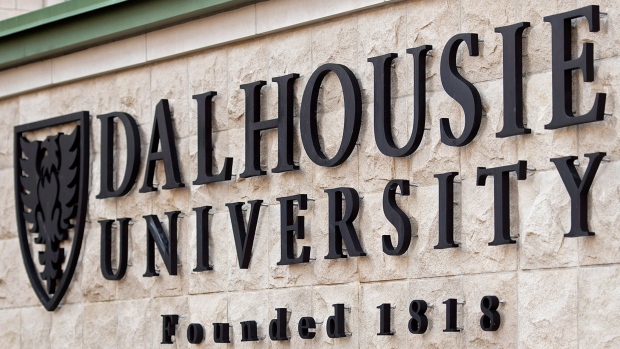Dalhousie University is restricting its search for a new senior position to racially visible and Indigenous candidates in an effort to make the institution more diverse.
In an email to the university community, provost and vice-president academic Carolyn Watters wrote that "community consultation is essential to the success of the search" for a new vice-provost student affairs.
"In keeping with the principles of our employment equity policy, and with an aim to increase the representation of under-represented groups at Dalhousie, this search for a new vice-provost student affairs will be restricted to racially visible persons and Aboriginal peoples at this time," she wrote.
Jasmine Walsh, assistant vice-president for human resources, said while Dalhousie has done a good job of hiring diverse faculty, it has a way to go when it comes to management positions.

Jasmine Walsh, assistant vice-president of human resources at Dalhousie University, says the restricted search is just one part of an effort to be more representative. (Submitted by Jasmine Walsh)
"Dalhousie strives to be an inclusive space for all members of our community, and we acknowledge that this requires us to be in a constant state of learning and working within our communities to make sure that we're living up to the commitment that we make," she told the CBC's Maritime Noon.
According to Dal's 2016 Be Counted census campaign, the percentage of racially visible employees increased to 11 per cent in 2016 from 8.3 per cent in 2015, with the largest gains in faculty positions.
Still, in 2016, just 1.9 per cent of employees were Indigenous.
The representation was also far less in academic management positions, with 4.7 per cent identifying as racially visible and 1.6 per cent as Indigenous.
"Based on our most recent data, we do have gaps," Walsh said. "We're one or two people short of where we need to be in order to be representative of the labour market in relation to those positions."
Walsh said the university looks at data from Statistics Canada to understand who's working in various fields, and tries to reflect that equity on campus.
The university hopes to attract candidates by reaching out to Indigenous and racially visible communities to build stronger relationships, she said.
Walsh said this approach is still about hiring the most qualified people.
"From my perspective, there isn't a merit argument that runs counter to this. In fact, this actually is the way for us to develop the most meritorious faculty and staff population," she said.
"This actually is the way for us to develop the most meritorious faculty and staff population."- Jasmine Walsh, assistant vice-president
And as the student body becomes more diverse, it's all the more important, Walsh said.
"It's critically important that students who are coming onto campus are able to see themselves reflected, not just in the leadership from a staff standpoint, but particularly within the classroom with our professors," she said.
Amina Abawajy, president of Dalhousie's student union, works closely with the vice-provost student affairs, and said she applauds the university for designating the position.
"When issues of especially equity, diversity and inclusion come up, it's really great to not have to explain where I'm coming from or where students are coming from — to really know that this person has an understanding of intersectional oppression and forms of oppression and how they manifest on campus," said Abawajy, who also sits on the hiring committee.

Amina Abawajy is the president of the Dalhousie Student Union. (Steve Lawrence/CBC)
She said she wants the university to do even more, especially since more people of colour are getting involved in student leadership.
"I think that the numbers are evident that representation is lacking, and so I really do hope that folks understand that this is not only something that is useful and important, but is something that is needed," she said.
As Dalhousie marks the 200th anniversary of its founding, it's also grappling with its troubled past when it comes to race, racism and slavery.
"I think taking on this work in a public and a committed way suggests that it hasn't been done already, and that it needs to be done," Walsh said.
"So we have work to be done at Dalhousie. There's no questions about that, but we're very much committed to making sure that we're successful in our efforts going forward."
The full text of Watters's email appears below.
To: The Dalhousie University community
From: Carolyn Watters, Provost and Vice-President Academic
Date: January 26, 2018
Re: Search for Vice-Provost Student Affairs
Dear colleagues:
We have embarked on the process of selecting a new Vice-Provost Student Affairs. We are proceeding with this search as Dr. Arig al Shaibah will be leaving Dalhousie for another position at the end of March. There will be an opportunity in the near future to thank Arig personally for her many contributions to Dalhousie, especially her leadership of Student Affairs and Human Rights and Equity Services.
Dalhousie has retained Odgers Berndtson to assist with our search for the next Vice-Provost Student Affairs. This is a very important matter for the University and community consultation is essential to the success of the search. Please click here to complete a brief anonymous questionnaire. All responses will be held in strict confidence by Odgers Berndtson and the inclusion of your name is optional.
In keeping with the principles of our Employment Equity Policy, and with an aim to increase the representation of underrepresented groups at Dalhousie, this search for a new Vice-Provost Student Affairs will be restricted to racially visible persons and Aboriginal peoples at this time.
This is a very important matter for Dalhousie University and your input is important. Please assist the Committee by completing your questionnaire by February 9, 2018.
Thank you for your time and input.
Yours truly,
Carolyn Watters, Provost and Vice-President Academic
Chair, Vice-Provost Student Affairs Search Committee

























